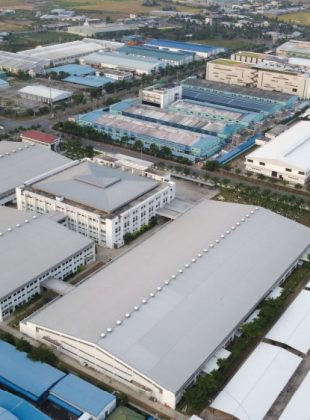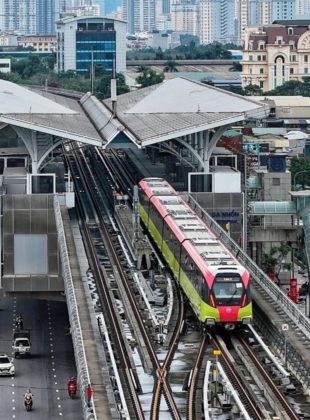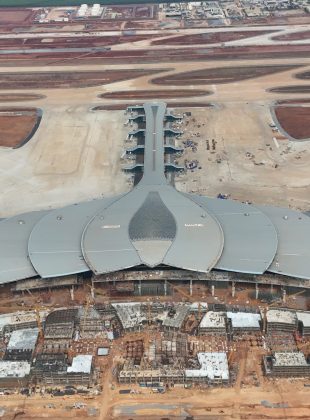Using a rooftop solar power system is an effective selection for manufacturers to avoid the impact of the retail electricity prices increase on their operation.
In early October, the Ministry of Industry and Trade (MoIT) sent the report to the government on the draft decree regulating the mechanism and policies to develop rooftop solar power.
The report indicates that 21 members of the government agreed to encourage the development of self-produced and self-consumed solar power installed on the roofs of construction works including houses, and offices.

Enterprises consider rooftop solar for long-term gain (Source: freepik.com)
Besides that, industrial parks and clusters, export processing zones, high-tech zones, economic zones, and production facilities are also encouraged to invest in rooftop solar power systems by legal regulations.
According to the draft decree, for systems with a capacity of less than 100kW and connected to the power system, if not fully used, electricity can be sold to the national power system, but not exceeding 20 per cent of the actual installed capacity.
This move is expected to encourage businesses and manufacturers to expand the rooftop solar power system to avoid risks relating to the increase in retail electricity prices. At the climb, the group of manufacturers will bear the largest impact from this electricity price hike.
For the manufacturing industry, there are 1.9 million customers with an average monthly spending of VND10.4 million ($430) for electricity who are estimated to pay an additional amount of around VND500,000 ($20) per month. Most notably in the cement sector, electricity costs account for about 14-15 per cent of the cost of goods sold. For paper manufacturing enterprises, electricity costs are estimated to be 4-5 per cent of sales costs and business management costs.
Nguyen Duc Thang, director of a garment company, said, “Prices of other inputs also increased along with the increase in electricity price. The production costs had increased by around 10 per cent so far this year, reducing the competitiveness of products.”
“Manufacturers must seek ways to reduce production costs, including arranging working times and saving energy, we are considering installing rooftop solar power.”
Using a rooftop solar power system has many advantages. According to statistics from Hero Future Energies Vietnam LLC, businesses just need to pay the cost to establish the rooftop solar power system for one time to use clean electricity within 25 years.
In the case of businesses using their equity capital or mobilise capital by themselves to install the system, the electricity price is zero. If they cooperate with the rooftop solar power manufacturer, the cost of electricity is 15-25 per cent lower than the prices bought from Vietnam Electricity (EVN).
The Vietnamese government is also building a mechanism to encourage the installation of rooftop solar power. The draft decree, initially released by the MoIT in April for public comment, specified that rooftop solar power development was intended for the sole purpose of self-consumption, with limited transmission to the national grid line. Surplus energy was not authorised to sell to other organisations or individuals, including EVN.
According to the draft decree, organisations and individuals who invest in rooftop solar projects but do not fully utilise their capacity will be allowed to sell up to 20 per cent of the installed capacity to the national grid at a price equal to the average price of the previous year.
Additionally, the decree expands regulations to permit trading and selling of self-consumption rooftop solar power within industrial and high-tech areas. The prime minister also requested that relevant agencies monitor and propose adjustments to related planning to competent authorities when necessary.
Despite having many advantages for the manufacturing sector, it still needs open mechanisms to encourage businesses to install rooftop solar power systems.
“The current regulations at the draft decree are not equal for all businesses. The draft on renewable energy only allows manufacturers to invest with their own money, meaning that they must have good financial potential. These manufacturers are almost certainly large corporations and companies, mostly foreign-invested companies. When they invest in renewable energy, they will receive more orders, increasing their competitiveness compared to factories that do not install renewable energy,” said Tran Dang Khoi, general director of Hero Future Energies Vietnam LLC.
In addition, using electricity from renewable energy will not be affected by the annual increase in electricity prices throughout the life of the system (an average increase of 5 per cent per year, as recently).
Khoi also shows that their investment in renewable energy also helps them declare to state agencies to enjoy tax and investment incentives, meaning that they will become richer.
“For small- and medium-sized enterprises, and even large companies that due to internal policies do not want to invest themselves, they cannot enjoy the advantages because they do not have money. They also have to focus on struggling with their main business. Therefore, in this case, they can consider buying power from third-party rooftop solar power manufacturers and installers,” Khoi added.
Oanh Nguyen
(VIR)













